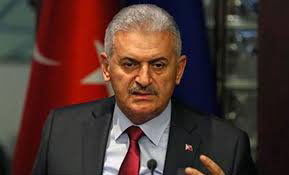DIYARBAKIR, Turkey, (Reuters) – Turkish authorities arrested the leaders of the country’s main pro-Kurdish opposition party in a terrorism investigation yesterday, drawing strong international condemnation of a widening crackdown on dissent under President Tayyip Erdogan.
Selahattin Demirtas and Figen Yuksekdag, co-leaders of the Peoples’ Democratic Party (HDP), were jailed pending trial after being held in overnight raids, officials said. Ten other HDP lawmakers were also detained, although some were later released.

The arrest of elected members of the Turkish parliament’s third largest party, and the detention or suspension of more than 110,000 officials since a failed coup in July, may “go beyond what is permissible”, the U.N. human rights office said.
The United States expressed deep concern, while Germany and Denmark summoned Turkish diplomats over the Kurdish detentions, and European Parliament President Martin Schulz said the actions “call into question the basis for the sustainable relationship between the EU and Turkey”.
Turkish Prime Minister Binali Yildirim told reporters: “Turkey is a nation of laws, nobody has preferential treatment before the law … What has been done is within the rule of law.”
The HDP lawmakers were arrested after they refused to give testimony in a probe linked to “terrorist propaganda”, Yildirim said, adding: “Politics can’t be a shield for committing crimes”.
Hours after the detentions, a car bomb killed nine people and wounded more than 100 near a police station in the southeastern city of Diyarbakir where some of the lawmakers were being held.
The HDP, which made history last year by becoming the first Kurdish party to win 10 percent of the vote and enter parliament, said the detentions risked triggering civil war.
In a video message on a website close to the Kurdish PKK militants, one of the group’s top commanders, Murat Karayilan, said the group would intensify its three-decade-old armed struggle against Turkey and called on Kurds – the country’s largest minority – to react.
Islamic State jihadists later claimed responsibility for the attack in Diyarbakir, according to the militant group’s Amaq news agency.
Islamic State leader Abu Bakr al-Baghdadi in a speech released on Thursday had called for attacks on Turkey, saying it had sided with the enemy, with Turkish troops fighting them in Syria.
Access was restricted to social media including Twitter, WhatsApp, YouTube and Facebook – making them so slow they were effectively impossible to use – and a ban imposed on media coverage of the car bomb. Asked about the measures, Yildirim said access would return to normal “once the danger is removed”.
U.S. State Department spokesman John Kirby said: “The United States is deeply concerned by the Turkish government’s detentions of opposition members of parliament … and by government restrictions on Internet access today.”









